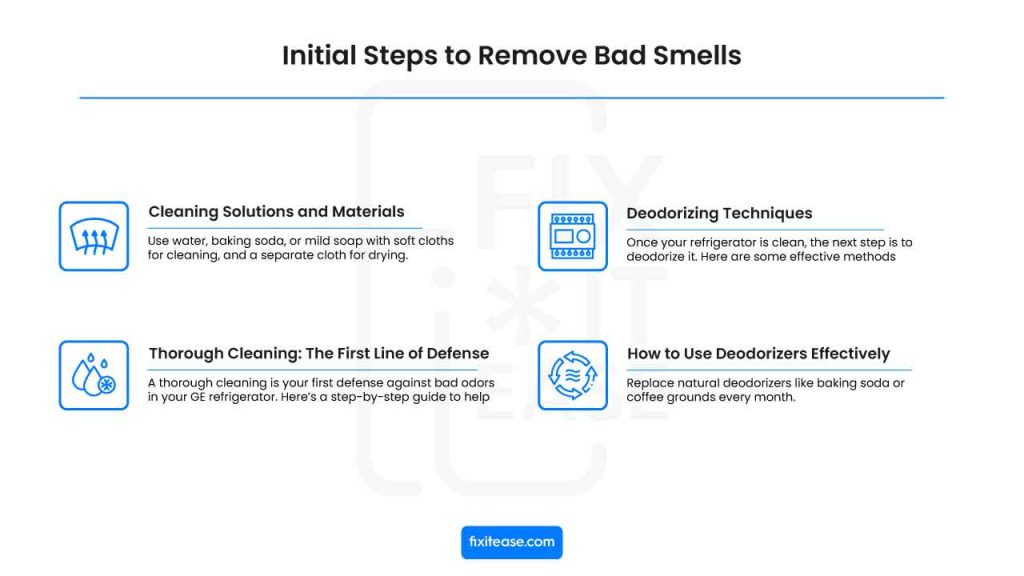Why Your GE Refrigerator Smells Bad (Causes and Solutions)
Spoiled food and lingering moisture in your GE refrigerator are often the culprits of unpleasant odors. Mold growth and bacterial buildup can turn your fridge into a source of mystery smells.
These are not just minor annoyances but signs that your refrigerator needs attention. I’ve faced this exact issue in my kitchen, and I understand how it can be puzzling and frustrating. But there’s a silver lining: once you know what to look for, solving these odor issues becomes manageable.
The journey to a fresh-smelling fridge often starts with simple steps like regular cleaning and proper food storage. I’ve gathered some practical strategies and easy fixes that worked wonders for me. So, let’s tackle this together, ensuring your GE refrigerator remains a fresh and welcoming part of your home.
The Causes of Bad Smells in GE Refrigerators
Dealing with a bad smell in your GE refrigerator is puzzling and frustrating. Still, the first step to understanding the causes is freshening it up. Various factors can lead to unwelcome odors, from forgotten leftovers to unseen moisture buildup. Let’s explore the typical culprits behind these smells and how to effectively tackle them, keeping your fridge smelling clean and fresh.
- Food Gone Bad: A frequent cause of odors in your GE refrigerator is spoiled food. Items like leftovers, fruits, and vegetables can easily be overlooked and left to spoil, especially if they’re pushed to the back or hidden. Once these foods begin to decompose, they release unpleasant smells. It’s essential to routinely check and remove any food that looks or smells off to prevent these odors from spreading.
- Moisture Buildup: Moisture can accumulate in various parts of your refrigerator, particularly in less visible areas like under drawers or corners. This damp environment is ideal for the growth of mold and bacteria. Even small amounts of moisture can lead to a big problem with smells, so keeping the inside of your fridge dry is critical.
- Mold and Bacteria: These tiny organisms love your fridge’s moist, cool environment. They can start growing in nooks and crannies you might not initially notice. When mold and bacteria multiply, they produce that musty, sour smell. Regular cleaning to remove these microorganisms is essential for keeping your refrigerator smelling fresh.
- Regular Cleaning: Keeping your fridge clean is vital in preventing smells. This includes wiping down all surfaces, like shelves and drawers, and ensuring no food spills or residues. A good clean-up routine can significantly reduce the chances of odor-causing mold and bacteria taking hold.
- Food Checks: It’s a good habit to inspect the contents of your refrigerator frequently. Check for any perishable items that may be past their prime. Regularly sorting through your fridge and removing expired or spoiling food will help control unpleasant odors.
- Proper Food Storage: How you store food in your refrigerator also significantly prevents bad smells. Using airtight containers and properly sealing food can prevent spoilage and reduce the risk of odors. This also helps prevent cross-contamination between foods, which can be another source of bad smells.
- Refrigerator Condition: Another often overlooked factor is the condition of the refrigerator itself. Old or malfunctioning refrigerators might not maintain the correct temperature or humidity levels, creating an environment conducive to mold and bacterial growth. Regular maintenance checks, ensuring the temperature is set correctly, and promptly addressing any functional issues can help maintain an odor-free fridge.
Initial Steps to Remove Bad Smells

When you first notice a bad smell in your GE refrigerator, don’t worry. There are some simple steps you can take to get rid of it.
Cleaning Solutions and Materials
- A mixture of water and baking soda or mild dish soap.
- Soft cloths or sponges.
- A separate cloth for drying.
Thorough Cleaning: The First Line of Defense
A thorough cleaning is your first defense against bad odors in your GE refrigerator. Here’s a step-by-step guide to help:
- Empty the Fridge: Begin by removing all the contents of your refrigerator. Check each item and throw away anything that’s expired or looks spoiled.
- Prepare a Cleaning Solution: Mix warm water, baking soda, or mild dish soap. This mixture is effective and gentle on your fridge’s surfaces.
- Wipe Down Interior Surfaces: Using a soft cloth or sponge, clean all the interior surfaces of your fridge, including shelves, walls, and drawers. Pay special attention to any spills or stains.
- Clean the Seals: Don’t forget the door seals. Use a damp cloth to wipe them down, as dirt and grime can accumulate here, contributing to smells.
- Dry Everything: After cleaning, dry all surfaces with a dry cloth to prevent moisture buildup.
Deodorizing Techniques
- Once your refrigerator is clean, the next step is to deodorize it. Here are some effective methods:
- Use Baking Soda: An open box of baking soda is excellent for absorbing odors. Place it on one of the shelves.
- Activated Charcoal: This is another natural deodorizer. Place a few activated charcoal briquettes in a bowl and leave it in the fridge.
- Fresh Coffee Grounds: Coffee grounds can also help neutralize odors. Place a bowl of fresh grounds in the refrigerator for a day or two.
- Commercial Deodorizers: If natural methods aren’t enough, consider using commercial deodorizers designed for refrigerators. Follow the instructions on the product for the best results.
How to Use Deodorizers Effectively
- Replace natural deodorizers like baking soda or coffee grounds every month.
- For commercial deodorizers, follow the recommended usage guidelines.
- Ensure your fridge is clean before placing deodorizers, as they work best in a clean environment.
- By following these steps for cleaning and deodorizing, you can effectively remove and prevent bad odors in your GE refrigerator, keeping it smelling fresh and clean.
Preventative Measures to Keep Your GE Refrigerator Smelling Fresh
Simple habits like regular cleaning and proper food storage can make a huge difference in preventing those unwanted odors. It’s easy to keep your GE refrigerator smelling fresh. Let’s look at some easy steps you can take to ensure your fridge stays pleasant and odor-free.
- Clean Regularly: Regularly clean your GE refrigerator to prevent odor buildup. Wipe down shelves, walls, and drawers at least once a month to remove spills and crumbs.
- Check Food Frequently: Make it a habit to check the contents of your fridge weekly. Discard any expired or spoiled food to avoid odor development.
- Storage Food Properly: Store food in airtight containers to contain odors and maintain freshness. This also helps in preventing cross-contamination.
- Use Baking Soda: Keep an open box of baking soda in your fridge. It’s great for absorbing odors and is a simple, cost-effective solution.
- Control Humidity Levels: If your fridge has a humidity control feature, keep the air dry and prevent mold and odor buildup.
- Manage Leftovers Smartly: Label leftovers with dates to keep track of their freshness. Consume or discard them within a few days to prevent spoilage.
- Regularly Clean Drip Pans and Door Seals: Don’t forget to clean the drip pans and door seals, as they can harbor odor-causing residues and mold.
- Ventilation: Ensure your fridge is not too packed. Adequate air circulation helps maintain an even temperature and reduces the chances of odor buildup.
- Fruit and Vegetable Management: Store fruits and vegetables correctly and use them timely. Overripe fruits and rotting vegetables are common sources of bad smells.
- Routine Defrosting: If your refrigerator isn’t frost-free, regular defrosting is necessary to prevent ice buildup, which can contribute to odor issues.
When Do You Nedd a Professional
There are times when the issue of bad smells in your GE refrigerator might be beyond simple cleaning and deodorizing methods. Here’s when you should consider calling a professional:
Persistent Odors After Cleaning: If you’ve thoroughly cleaned your refrigerator and the bad smell persists, it might indicate a deeper issue. A professional can diagnose and resolve underlying problems like mold within the cooling system or hidden spills in difficult-to-reach areas.
Electrical Smells: If the odor resembles burning plastic or an electrical scent, it’s essential to call a technician immediately. This could be a sign of an electrical malfunction, which is not just about bad smells but also safety.
Water Leakage: If you notice water pooling around your refrigerator, it might be due to a blocked defrost drain or a problem with the water line. These are issues that often require professional intervention.
Fluctuating Temperatures: If your refrigerator isn’t maintaining a consistent temperature, it can lead to food spoilage and odors. A professional can check the thermostat and cooling mechanisms to ensure they function correctly.
Unusual Noises: Sounds like buzzing, humming, or clicking that are out of the ordinary can indicate a problem with the fridge’s mechanics. A technician can accurately pinpoint and fix the issue.
Ice Buildup: Excessive ice buildup, especially in frost-free models, warrants a professional check. It could be a sign of a faulty defrost heater or other components.
FAQ
Why does my GE refrigerator have a bad smell?
Bad smells in your GE refrigerator are often caused by spoiled food, mold and bacteria growth due to moisture or lack of cleaning. Check for expired items and clean your fridge regularly using mild cleaning solutions. Keeping an open box of baking soda inside also helps absorb unwanted odors.
Can a water filter cause my GE refrigerator to smell?
Yes, an old or clogged water filter in your GE refrigerator can lead to unpleasant smells. Over time, filters can harbor bacteria and mold, affecting the water’s taste and smell. Replace your water filter every six months or as the manufacturer recommends to prevent this issue.
What should I do if cleaning doesn’t remove the bad smell from my GE fridge?
If cleaning doesn’t eliminate the odor, it might be due to hidden mold, electrical issues, or a malfunctioning component. In such cases, it’s advisable to consult a professional technician to diagnose and fix the problem, ensuring your fridge is safe and odor-free.
Is it normal for a new GE refrigerator to have a smell?
It’s not uncommon for new GE refrigerators to have a slight plastic or chemical smell initially. This is usually due to manufacturing residues and often dissipates after thoroughly cleaning and ventilating for a few days. If the smell persists, contact customer support for further advice.
How often should I clean my GE refrigerator to prevent bad smells?
To prevent bad smells, clean your GE refrigerator thoroughly every month and wipe up spills immediately. Regular checks for expired food and proper food storage in airtight containers are also crucial. Additionally, keeping an open box of baking soda inside helps maintain freshness.
Conclusion
Keeping your GE refrigerator free from unpleasant odors is about staying on top of regular cleanings and being mindful of what goes in and out. By incorporating these simple practices into your routine, such as timely cleaning and intelligent food storage, you can ensure your fridge remains a fresh, welcoming part of your kitchen.
If stubborn smells persist or you suspect a more severe issue, it’s always wise to seek assistance from a professional. With these strategies, you can maintain a clean, odor-free refrigerator, enhancing your daily kitchen experience.



